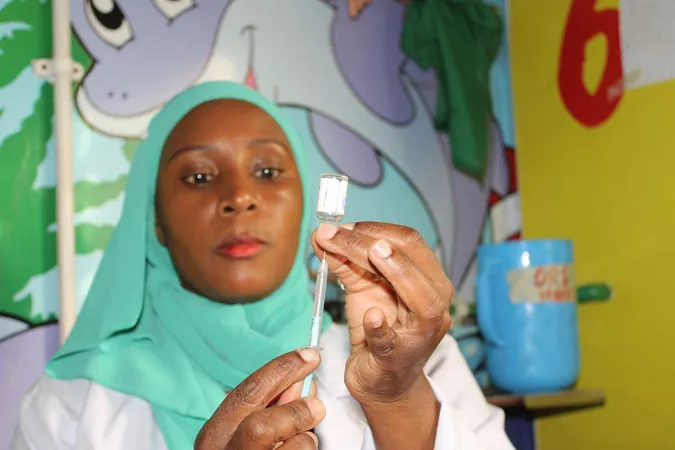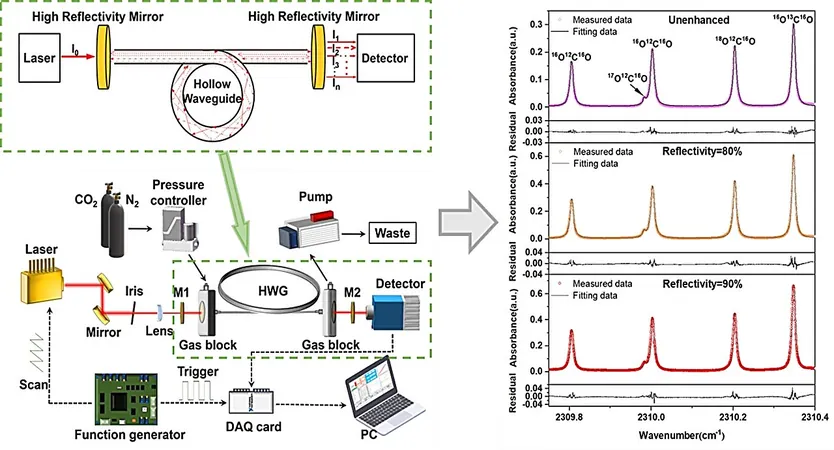
Empowering Kenya's Kibra: Nurses Champion the HPV Vaccine Movement
2025-03-25
Author: Mei
In the heart of Kibra, Nairobi's largest informal settlement, Nurse Lencer Akinyi is on a mission to combat misinformation and promote the HPV vaccine, a crucial tool in preventing cervical cancer. During a recent health talk at the Karanja Road community clinic, her voice was filled with urgency as she discussed essential hygiene practices, particularly the need to boil drinking water ahead of anticipated heavy rains.
"Mumenielewa?" she asked the audience, measuring their understanding through their responses. After the talk, a few attendees approached her for more personal consultations, highlighting the trust and rapport she has built within the community. A mere fifteen-minute discussion can yield significant results, as demonstrated by residents like Josephat Muyayi, who, after attending a similar session last year, decided to vaccinate his daughter against HPV.
Cervical cancer is a grave threat in Kenya, claiming the lives of 3,591 women annually. The vaccination is particularly critical for girls aged 10 to 14, as it can block over 90% of cervical cancers. However, numerous barriers hinder vaccine uptake in Kibra; many residents lack access to smartphones and mass media, contributing to persistent vaccine hesitancy fueled by swirling myths.
Akinyi explained, "The population in the slum is unique. Some individuals may not receive regular health updates, and high poverty levels mean vaccination often takes a backseat to immediate survival needs. I know firsthand the struggles parents face, as they juggle the challenges of raising children in an environment where drug abuse and early sexual activity are prevalent."
Despite the obstacles, the nursing staff, community health promoters, and public health officers in Kibra have united their efforts to ensure every eligible girl receives the HPV vaccine. Evidence of their success is growing; in 2023, the number of HPV vaccinations rose significantly, with 2,806 for the first dose and 1,790 for the second, up from 1,946 and 1,659 in 2022, respectively.
Addressing initial setbacks, Akinyi recalls how some children arrived on vaccination days with consent forms marked "do not vaccinate." Building trust with local schools proved essential, and now, school administrators are requesting vaccination days, showcasing a positive shift in community attitudes.
For girls unreachable in schools, health workers like Rukia Jamaldin step up to trace them directly to their homes. Despite facing resistance from some community members, Jamaldin remains steadfast, sometimes even spending her own money to assist those in need. She knows that providing support is key to building rapport and fostering acceptance of the vaccine.
Since the HPV vaccine's introduction in Kenya in 2019, over 3.3 million girls have received the first dose, with 2.3 million receiving the second. The Ministry of Health is optimistic about increasing these numbers this year, particularly after acknowledging the importance of a cohesive vaccination strategy.
“We aim to integrate the HPV vaccine into community consciousness, just as we've done with previous vaccines like measles and polio,” said Peter Njoroge, deputy logistics officer for the Nairobi County. “As we see community-led initiatives fostering awareness, it’s integral to our goal of preventing unnecessary deaths from a preventable illness.”
With health workers like Akinyi and Jamaldin at the forefront, the fight against cervical cancer in Kibra is gaining momentum, showing that education and community engagement can truly change lives. The goal remains clear: to work together and ensure that no woman has to suffer from preventable diseases like cervical cancer. The HPV vaccine is not just a health measure; it’s a movement towards stronger, healthier futures for the women of Kenya.




 Brasil (PT)
Brasil (PT)
 Canada (EN)
Canada (EN)
 Chile (ES)
Chile (ES)
 Česko (CS)
Česko (CS)
 대한민국 (KO)
대한민국 (KO)
 España (ES)
España (ES)
 France (FR)
France (FR)
 Hong Kong (EN)
Hong Kong (EN)
 Italia (IT)
Italia (IT)
 日本 (JA)
日本 (JA)
 Magyarország (HU)
Magyarország (HU)
 Norge (NO)
Norge (NO)
 Polska (PL)
Polska (PL)
 Schweiz (DE)
Schweiz (DE)
 Singapore (EN)
Singapore (EN)
 Sverige (SV)
Sverige (SV)
 Suomi (FI)
Suomi (FI)
 Türkiye (TR)
Türkiye (TR)
 الإمارات العربية المتحدة (AR)
الإمارات العربية المتحدة (AR)